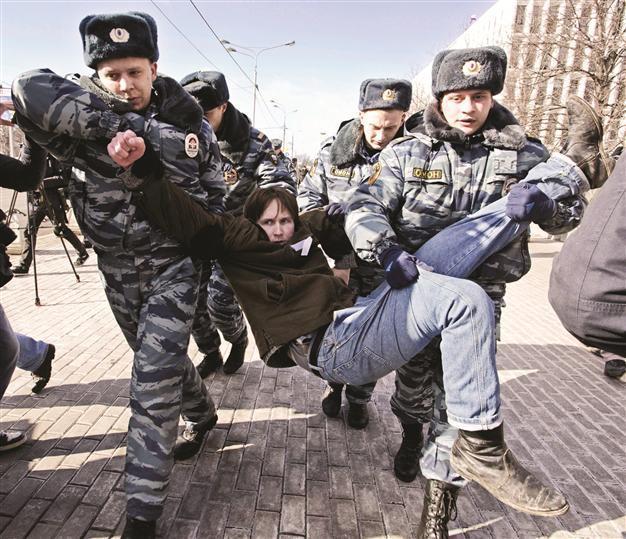Russian raid on NGOs spirals amid concerns

Russian police detain an opposition supporter calling for the release of two jailed members of the Pussy Riot band. More than 100 NGOs, whose work bothers Russian authorities, have undergone unannounced raid in recent days. AFP photo
Russian authorities have renewed a campaign of pressure against nongovernmental organizations in the country facilitated by the adoption of restrictive laws in 2012, targeting the Moscow offices of Human Rights Watch (HRW), Transparency International and the Kazan-based advocacy group Agora.
Officials searched the Moscow offices of HRW yesterday as they stepped up their raids against pro-democracy groups. HRW’s Europe and Central Asia department head, Rachel Denber, said three representatives from the prosecutor’s office and a tax official had begun what they called “an unplanned inspection” of the Moscow office early yesterday. She added that the Moscow headquarters of the Civic Assistance refugees’ center and of the Transparency International corruption watchdog had been raided in a similar manner.
“This is part of a massive, unprecedented wave of inspections of nongovernmental organizations in Russia that is intensifying pressure on civil society in the wake of the adoption of number restrictive laws last year,” Denber said.
The raids followed President Vladimir Putin’s signature of a law that labeled Russian political organizations with Western funding as “foreign agents” that required more rigorous checks. Russian officials have not specifically linked the raids to the foreign agent law and they appear part of an in-depth examination into the activities of nongovernmental groups whose work bothers the authorities.
“The scale of the inspections is unprecedented and only serves to reinforce the menacing atmosphere for civil society,” Hugh Williamson, HRW’s Europe and Central Asia director, said earlier this week after a raid on Amnesty International’s Moscow branch.
State TV filming raidsA television crew from NTV, a pro-Kremlin station, which has been used by the Kremlin for hatchet jobs against its political foes, arrived with the inspectors to film the proceedings in each raid.
“The foreign agent law was, from the start, aimed at demonizing advocacy groups in Russia,” Williamson said in a statement published on HRW’s official website. “It’s distressing, but sadly unsurprising, that NTV is part of the effort to discredit independent voices.”
The Russian prosecutor’s office has stated publicly that it plans to inspect between 30 and 100 nongovernmental organizations in each of Russia’s regions, which could amount to thousands of groups throughout the country. The authorities began their action last week by moving in against Memorial – one of the country’s most respected rights organizations whose vast catalogue of Stalin-era repressions is accessed by scholars around the world. Officials also this week conducted an audit at the headquarters of Amnesty International.
The raids have already raised eyebrows in Europe and threaten to further complicate Putin’s uneasy relations with the West. EU foreign policy chief Catherine Ashton called the inspections and searches “worrisome since they seem to be aimed at further undermining civil society activities in the country.”
Germany also voiced its concerns with Russian diplomat Oleg Krasnitzki, second in rank behind the ambassador to Berlin, had been summoned for a conversation at the request of Foreign Minister Guido Westerwelle, over an inspection of the St. Petersburg offices of the Konrad Adenauer Foundation (KAS) – a political think tank with ties to Chancellor Angela Merkel’s Christian Democratic Union.
France joined Germany yesterday, demanding explanations from the Russian Embassy in Paris on raids seen as a crackdown on pro-democracy bodies. A Foreign Ministry diplomatic source said that although the Russian ambassador had not been “summoned,” he had been “invited” to provide an explanation.
